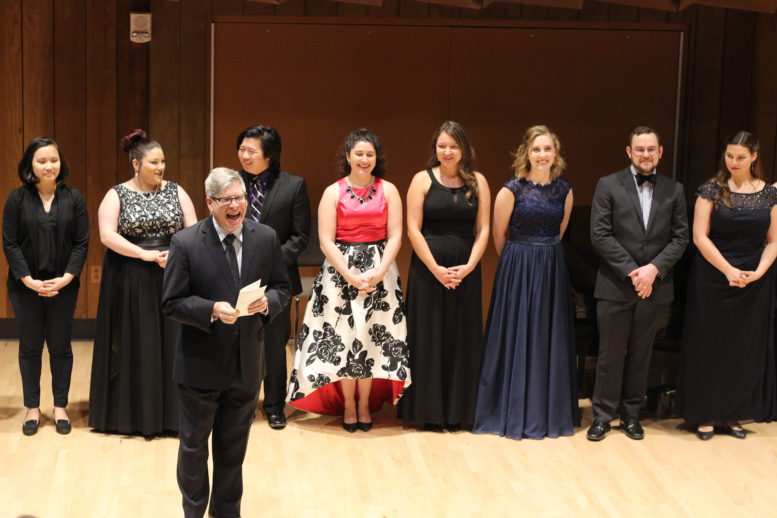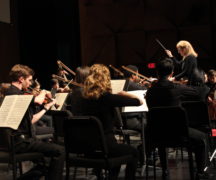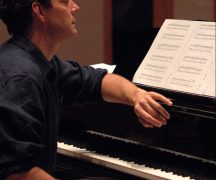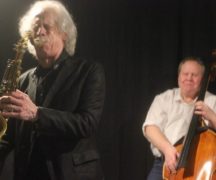By DAVID DUPONT
BG Independent News
Yes, the final round of the Conrad Art Song Competition at Bowling Green State University was, as the name makes clear, a competition. More than that it was a night of beautiful singing.
That was the assessment of Kevin Bylsma, the coordinator of opera activities at the College of Musical Arts.
The 18th annual competition featured 11 duos of vocalists and pianists in the undergraduate division and 12 duos in the graduate division. (The division is determined by the singer.) Honors go equally to the singer and the pianist.
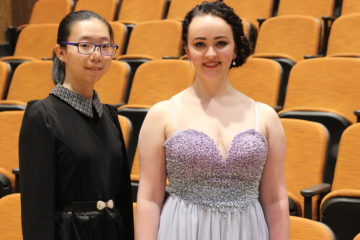
Undergraduate winners Xiaohui (left) and Hannah Stroth.
They must prepare a program of a half a dozen songs from different periods, including at least one selection from a living composer, with one song each in English, German, Italian and French.
Regardless of the language, the 10 duos, five in each division, selected for the finals delivered emotion-packed performances, sometimes touching, sometimes coquettish, sometimes even funny.
The power of drama was demonstrated in the first set by soprano Hannah Stroh with pianist Xiaohui Ma singing “He is Dead and Gone” in Russian. Even Russian wasn’t up to the task of expressing anguish, as Stroh leaned back against the piano, and began humming. The sound of her voice disembodied, as if emanating from the air itself. Then the song’s emotion swerved, ending with a demonic laugh.
You didn’t need to speak Russian to be taken aback.
A few hesitant claps were heard, then full blown applause.
The decorum of the night – applause are usually reserved for the end of a duo’s performance – was disrupted, not to be regained.
And Stroth had set the mark for the rest of the singers.
Stroth and Ma ended the evening as the winners of the undergraduate division. The graduate division was won by soprano Savanah Stricklin and pianist Paul Shen.
Other undergraduate winners were: tenor Luke Schmidt and pianist Yuefeng Liu, second, and baritone Daniel Baumgartner and pianist Adam O’Dell, third.
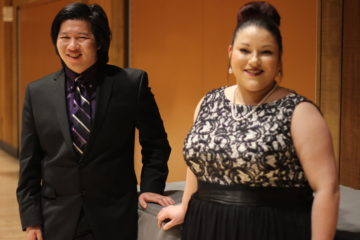
Graduates winners, Paul Shen and Savanah Stricklin.
Other graduate winners were: soprano Amanda Williams and pianist Hannah Bossner, second, and soprano Hillary LaBonte and pianist Zach Nyce, third.
Stricklin, who studies with Sujin Lee, said the drama is an essential part of performing an art song. “Art song is about finding its own drama. In opera we have a scene set for us. That’s the challenge of art song, setting the scene for the audience.”
On the other hand, Stroh said, “it can be difficult not to be too dramatic, and it affects the technique.”
She credited her teacher Myra Merritt with teaching her the right balance. “The focus is mostly on the singing. As long as that’s coming along, we can add the acting into it.”
Shen, a student of Robert Satterlee, said as pianist it is his job to help set the scene and know how to support the singer’s dramatic moments.
Stricklin said there needs to be a bond between the vocalist and the pianist.
Before working together they have to come to an understanding about the repertoire they will perform and commit to the long hours of rehearsal beyond their time during lessons.
During that time, Shen said, the two musicians must decide together on issues of interpretation.
Stroth said she decided she wanted to work with Ma after hearing her accompany another student.
Ma, a student of Satterlee, said she enjoys working with Stroh, “She has a gorgeous sound.”
Performing with a singer requires more flexibility than performing solo. “It shapes me in different ways,” she said. “When I play solo, it’s my own interpretation. When I do collaborative piano, their musical ideas inspire me.”
Stroth said she looks for a pianist who can “follow my breath and expression.”
Stricklin said she chooses songs “I’m passionate about and finding something that fits with my voice.”
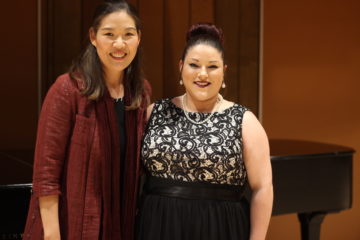
Sujin Lee (left) with her student Savanah Stricklin
In the finals, each duo performs three of the songs they have prepared. Unlike in some competitions, they are allowed to perform the complete number and are not cut off in the interest of time.
The musicians get to select the opening number, and then the judges get to ask for what they’d like to hear.
Stroh said in the finals, she was hoping the judges would not call for “O, quand je dors” by Franz Liszt. In the semifinals that afternoon, she’d had a memory lapse while singing it. So, she was pretty sure they’d want to hear the song again to make sure that was just a fluke. It was.
The contemporary songs provided many of the lighter moments. Baumgartner and O’Dell scored with their rendition of “Lonely and Neurotic,” a very odd personals ad set to music.
Adding further color to the kaleidoscopic program, LaBonte and Nyce, both students in the contemporary music doctoral program, drew from jazz pianist and composer Brad Mehldau’s book for “Extinguish my Eyes, I’ll Go on Seeing You.”
The winners, selected by judges Drake Dantzler, Kathryn Goodson, and Monica Swartout-Bedow, all from Michigan, receive cash awards with the first place duos performing concerts at later dates.

